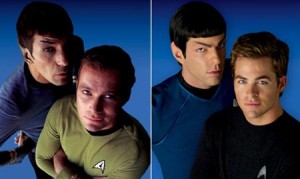I tend to stay away from certain writerly debates. You know, plotting v.  seat of the pants, first draft / fast draft, or the endless POV wars. But the character v. story discussion has recently got the best of me.
seat of the pants, first draft / fast draft, or the endless POV wars. But the character v. story discussion has recently got the best of me.
Becky Miller tackled the subject in a recent review of Donald Maass’ new book, and she seems to tilt toward character:
Since I read to find out what happened next, I never thought I would agree with this character first approach. But I’ve read too many stories of late in which I just didn’t care … until I got to know what drove the character forward. Then, if I’m engaged with the character, I’m engaged in the story.
Honestly, I haven’t thought a whole lot about it (read: I’m still a novice). To the degree I have, I think I’d concur with Becky’s assessment. I’m currently finishing the third book in the Odd Thomas series by Dean Koontz entitled, Brother Odd. I keep returning to this series for one simple reason — I like the central character. Yes, I know his circumstances will be, um, odd. Nevertheless, I have stayed with the series simply because I like the protagonist. Chalk one up for “character-driven” fiction.
But then there’s opinions like those of Stephen Koch who summarizes in his excellent Modern Library Writer’s Workshop:
Many will try to pit “character-driven fiction” against “story-driven” fiction. This imaginary opposition is a critical cliche, and it can only damage your work. The notion that you can get clarity about either character or story by slighting one in favor of the other is just plain wrong. Your characters are defined by their stories, and your story consists in nothing other than the action of its characters. To pit “character” against “story” is like trying to walk on one leg. (pg. 86)
Well, if you put it that way, perhaps there is more of a balance. After all, Oddie has to do something to reveal who he really is. So, like a pendulum, I swing back the other way.
And then I saw the new Star Trek. No, I’m not a Trekkie. But I invested enough of my reality-challenged adolescence into the original Star Trek series that I couldn’t resist seeing the new J.J. Abrams’ film (plus I really, really, liked the Abram-produced Cloverfield). The movie was lots of fun. I never bought into the Next Generation spin-off and, truth be told, it’s because I liked those original characters so much more. The cocky, impetuous Kirk. The dry, cerebral, Spock. And the surrounding cast, each with their own endearing malfunction. Though the new Star Trek movie is clearly attempting to bridge generations with a hip youthful cast and state-of-the-art effects, the strength of the film is in its re-introduction of those original Gene Roddenberry characters.
So, is the story incidental? Well, kinda. Yes, there’s Romulans, black holes, transporters, time travel, monsters, mind-melds, phasers and cloaking devices, all done at warp speed. There’s even a sighting of the famed Vulcan nerve pinch. But rest assured, what holds this movie together like Jupiterian gravity is the chemistry between Kirk and Spock. In fact, the throughline for the new film is how the crew of the Starship Enterprise was first assembled. Okay, so it’s somewhat revisionist (I mean, did Uhuru really have a thang for Spock?). Nevertheless, along the way we see old friends — Bones, Chekov, Uhuru and Scotty, all rebooted for the 21st century. And at its core is the wonderful interplay between two well-defined characters — James T. and his pointy-eared friend.
So I guess character DOES rule.
Of course, fans of Star Trek undoubtedly love their speculative science. The original series tapped into both a devoted sci-fi fan base and the exponential burgeoning of the technological age. But was the sci-fi scenario the main draw? Put Kirk and Spock in a frigate during the Napoleonic Wars, and you may or may not have a recipe for success. However you spin it, the Star Trek landscape is inseparable from the series. Still, it could be argued that without Kirk, Spock, McCoy, and Scotty, to explore that fantastic terrain, we just wouldn’t care as much.
So is it character or story? Maybe, like Koch suggests, there’s an “imaginary opposition” between the two. Trumping one or the other is “like trying to walk on one leg.” Nevertheless, in the world of Star Trek, I can’t help but conclude that character IS the better leg.














When I have to slog through a novel for a review because I've already checked out on the characters (or lack thereof), it's misery. I agree that the two points are not necessarily in opposition, but I'll tolerate almost any kind of story if I am engaged with the character(s).
The thrust of Nick Harrison and Jim Bell's "debate" actually was balance. I really do agree because I don't care how interesting the characters are, at some point, I want a story to go some where. I want something meaningful to happen. It's just that, if I don't care about the characters, then what happens doesn't feel all that meaningful.
Becky
I agree – I loved the new Star Trek because of the characters. The plot – well, it had a lot of holes. But the strength of character redeemed it and made it fly. I wrote a review which is currently on titletrakk.com and Splashdown Reviews if you want to look it up.